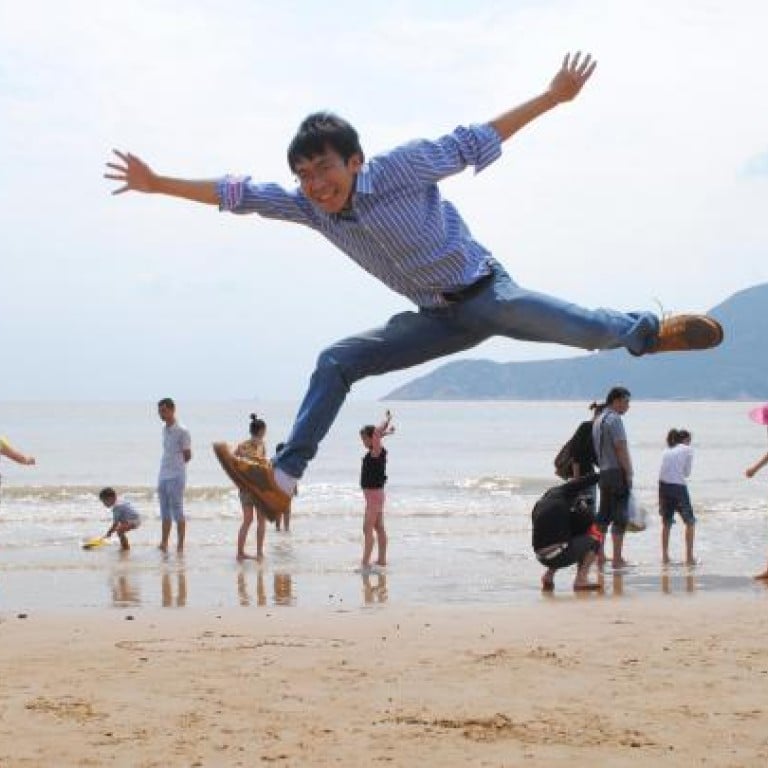
Chen Lu founded online community to help students go abroad
Chen Lu's online community advises young people on studying abroad
has attracted nearly 8,500 followers. On top of that, we organise meetings for like-minded people to get together and discuss specific topics. So far we have held such gatherings in several cities, including Beijing, Shanghai, Hangzhou , Hong Kong, New York and Singapore.
I was at university in 2009 when I learned about an internship programme in India that I was very interested in. I won't go into too many details, but I didn't get the chance because I lost my passport during my visa application process when I used a visa agent, and I couldn't get the visa on time. The internet is a vast source of information … but at the same time we're bombarded with so much different information. So I started thinking of a better way for like-minded people to share insights about their similar paths and experiences, which people like me want to learn about. But it wasn't until the first half of 2011 that I put my thoughts into action, along with a Chinese student in Canada who I met online, and his friend, a former intern with the United Nations. At the beginning, CAPE served mainly as a platform for overseas Chinese students to share experiences about their studies and lives in foreign countries.
Not long after CAPE was up and running in June 2011, two Singaporean university students majoring in applied maths, who were very interested in the US media industry, reached out to us via CAPE for help. They wanted to tour media organisations in the US and to get an insight into the impact of the media on young people. They could have turned to friends or a for-profit agency for help, but they thought CAPE was a better option. I was really surprised at how much advice and help they received via CAPE from people in the US who were originally from the mainland, Hong Kong, South Korea and Singapore. They were able to make their trip possible. That was something I felt was very rewarding.
People get to know CAPE largely via word of mouth and through references on social media sites such as microblog services, because CAPE is a non-profit endeavour run by a group of volunteers with no budget for advertising. Young Chinese people overseas accounted for most of the site visits at the beginning, but now half of CAPE fans live inside China, and they are much more diverse in terms of where they live and what kind of social background they come from. For instance, among the 26 people who attended a recent CAPE meeting in Zhoushan , Zhejiang , there were five students, two social workers and a 55-year-old civil servant, as well as aspiring young entrepreneurs. Many young people I've met are anxious about their futures and are often confused about what direction they will follow in their lives and careers, and I think that's why they come to CAPE.
What has made our gatherings different is that we have a particular theme for each one, so each participant comes with a purpose, such as to discuss a business plan or to brainstorm a particular issue with which they are concerned. Our meetings are not meant to be fun social gatherings. They are for like-minded people seeking inspiration.
I started with CAPE with the main goal being to help myself, but I am pleased to see that it has helped others take a deeper look at their lives, both as individuals and as members of a community, through the spirit of sharing. It's like wanting to emerge from the dark by yourself, but ending up lighting a candle for many others. I took two university entrance exams in back-to-back years in order to get into a good university, but I ended up settling for a vocational college far less prestigious than Peking or Tsinghua universities. I used to be so bothered by that, but I feel empowered when I consider that CAPE has offered people like me the chance to break through barriers that the traditional Chinese school system places in front of us. Our network has emboldened people with greater faith in themselves and gives them a heightened sense of equality, because someone in an isolated part of China can share ideas with people in a far-off developed country.
As all of us at CAPE work on a voluntary basis, we need to move things forward one step at a time. Actually, I need to cover most of the expenses for running the site myself, not to mention the time I dedicate to network maintenance and CAPE meetings. But I'm more than happy to do all that, because that's what I love to do. However, if possible I hope we can get more resources to build up our team and to make it more professional, in order to provide a better service in the future.
